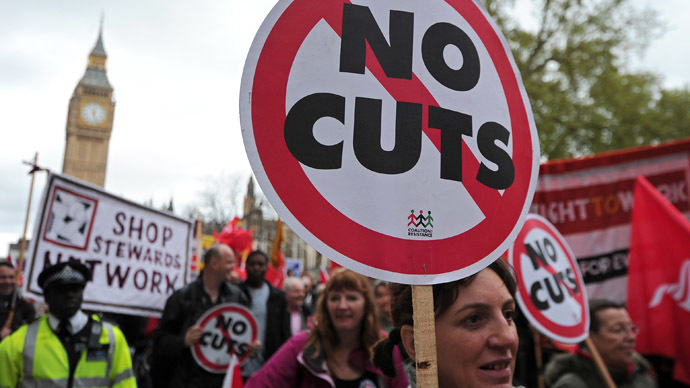
The UK has been going through its deepest recession since World War II, a report by the Institute for Fiscal Studies claims. Workers experienced unprecedented pay cuts of 6 per cent over the last five years since the Global Financial Crisis began in 2008.
Between 2010 and 2011, 70 per cent of employees who stayed in the same job fronted real wage cuts, while a third of those workers faced nominal wage freezes or cuts (12 per cent experienced freezes and 21 per cent experienced cuts).
The last time that such a high proportion of workers faced real wage cuts was between 1976 and 1977, when inflation exceeded 15 per cent. The proportions of nominal wage freezes and cuts are said to be the highest since the series of wage cuts began in the mid-1970s, according to the Institute for Fiscal Studies latest report.
The period since the recession began in 2008 has seen the longest and deepest loss of output in a century. Real wages have fallen by more than in any comparable five-year period; productivity levels have dropped to an unprecedented degree, the British think tank revealed.
Average real hourly wages amongst workers who stayed in the same job have fallen faster in the private sector than in the public sector over the last few years, such that the public-private sector wage gap has increased substantially over this period.
Among the main reasons why workers have experienced nominal wage freezes or cuts during this recession compared to previous ones is because the labor market is more flexible than it was in the 1980s or 1990s. There has been a dramatic decline in trade union membership over the last 30 years, from a peak of some 13 million members (37 per cent of the working age population) in the early 1980s to around 7.5 million (19 per cent) in 2008. This decline has been accompanied by a reduction in the proportion of employees covered by collective bargaining, which appears to have made it easier for employers to hold constant, or reduce, insiders’ wages.
“The falls in nominal wages that workers have experienced during this recession are unprecedented, and seem to provide at least a partial explanation for why unemployment has risen less – and productivity has fallen more – than might otherwise have been expected. To the extent that it is better for individuals to stay in work, albeit with lower wages, than to become unemployed, the long-term consequences of this recession in terms of labor market performance may be less severe than following the high unemployment recessions of the 1980s and 1990s,” Program Director at IFS and Managing Editor of Fiscal Studies Claire Crawford explained.
Meanwhile, half a million people in the UK have been resorting to food banks because of squeezes on benefits, wage cuts and the continuing economic downturn, with numbers trebling over the past year, a joint report by Oxfam and Church Action on Poverty revealed last month.
“The shocking reality is that hundreds of thousands of people in the UK are turning to food aid. Cuts to social safety-nets have gone too far, leading to destitution, hardship and hunger on a large scale. It is unacceptable this is happening in the seventh wealthiest nation on earth,” Chief Executive of Oxfam Mark Goldring was quoted as saying.
With wages and productivity falling down, poorer households are the hardest hit by the benefit cuts being implemented in the years to 2015–16, according to the IFS experts.
“Much of the pain for lower-income groups is occurring now or is still to come, because these groups are the most affected by the ongoing cuts to benefits and tax credits. Overall, we expect the period of recession followed by austerity to leave income inequality in 2015–16 about the same, or slightly lower, than in 2007–08,” a Senior Research Economist at IFS Robert Joyce predicted.
Britain has been much slower to recover from the global financial crisis than most large economies, such as the US, Canada, and Germany who have all managed to go back to their pre-recession economic levels.
According to the National Institute of Economic and Social Research, the UK's longest peacetime economic slump since 1920 has been plagued by high inflation, weak eurozone demand, and austerity measures.
Britain’s economy re-entered recession in 2012, the first double-dip recession since 1975. The slowdown prompted the government to pump 200 pounds of new capital into the economy through ‘quantitative easing’, an unprecedented measure by the Finance Ministry.
National currency also suffered a knockout during the recession. Over the past 30 years the British pound’s value has fallen by almost two thirds, according to a survey by Lloyds TSB Private Banking.
UK unemployment rose to 2.56 million in April, the Office for National Statistics revealed, while 70,000 people lost their jobs and ‘went on the dole’ between December and February 2013.